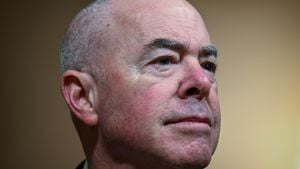Laura Helmuth, the editor-in-chief of Scientific American, America's oldest continuously published magazine, stepped down following considerable backlash over remarks she made about supporters of President-elect Donald Trump. Helmuth's resignation was announced on Bluesky, where she expressed her need to reflect on her future, indicating she would likely pursue hobbies like birdwatching after her 4.5-year tenure.
Helmuth's controversial comments came during her posts on election night, where she criticized Trump supporters, labeling some as "the meanest, dumbest, most bigoted" individuals. While she later sought to clarify and apologize for her comments, saying they were borne out of shock and confusion over the election results, the damage was done. Critics swiftly condemned her remarks as politicizing the established scientific publication.
The polarization intensified when Helmuth's comments provoked reactions from high-profile figures, including Elon Musk, who questioned her commitment to scientific integrity amid claims she was acting more as a political activist. Musk made his criticisms public, triggering discussions about the perceived shift at Scientific American under Helmuth's stewardship.
Under Helmuth's leadership, Scientific American did not shy away from taking political stances, famously endorsing Joe Biden for president during the 2020 election and Kamala Harris during the 2024 election—such endorsements are rare for the publication, marking only the second time it has made such endorsements throughout its 180-year history. These shifts, along with Helmuth's outspoken criticism of Trump supporters, have drawn ire from various quarters.
Post-resignation reflections have drawn attention to the broader controversies surrounding Helmuth's editing approach. Critics have targeted her for steering the magazine toward controversial social justice themes, inviting questions about the objectivity and integrity of the scientific discourse it aims to uphold. For example, Helmuth faced criticism for articles published during her tenure, which some claimed deviated from providing grounded, scientific discourse, and crossed over to political advocacy.
One notable incident involved discussions surrounding the controversial topics of gender medicine and treatment for minors experiencing gender dysphoria. Several articles during Helmuth's editorship seemed to dismiss dissenting opinions and research pertaining to the safety and efficacy of treatments like puberty blockers, raising alarms about the potential negative impacts of such one-sided narratives on public perception and policy.
Helmuth’s issues with social media expression have highlighted broader concerns about how personal beliefs may intertwine with professional responsibilities, particularly within scientific circles where objectivity is key. Helmuth accused individuals from her generation of being “full of fascists” and criticized her home state of Indiana for its purported racism and sexism, remarks she later tried to retract.
Despite attempts to mitigate the fallout from her posts, her resignation appeared inevitable, looming over her for days after the comments had gone viral. Helmuth’s tenure has, for some, become emblematic of the tension between scientific communities and the growing belief among certain factions of society about the necessity of holding public opinions to rigorous scrutiny.
Following Helmuth's resignation, Scientific American president Kimberly Lau stressed the decision was hers alone, albeit following intense scrutiny on her leadership. This resignation is seen as particularly significant as it places Scientific American amid intensified debates over misinformation and the responsibility of scientific publications to rise above politically charged narratives.
Overall, Helmuth's departure serves as a reflection of the challenges facing traditional scientific media outlets as they navigate the waters of political partisanship and ideological battles. Remaining transparent amid such tumultuous times will likely be pivotal for the future credibility of Scientific American and publications alike. The turbulent ending of Helmuth’s editorship marks both the close of one era and the potential for renewed scrutiny moving forward.



